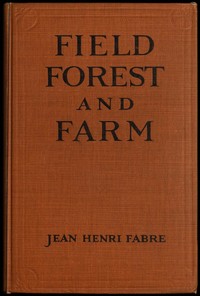Field, Forest and Farm by Jean-Henri Fabre
"Field, Forest and Farm" by Jean-Henri Fabre is a scientific publication written in the early 20th century. The work delves into the intricacies of nature, focusing particularly on agriculture, plant biology, and the essential relationships between various ecosystems and their inhabitants. Fabre is well-known for his passion for nature and his educational approach, making this book an engaging read for both nature enthusiasts and professionals in fields like gardening and farming. The
opening of the book introduces Uncle Paul, who shares his knowledge about wheat with his nephews during their summer walks. He explains the process of turning wheat into flour and the history behind bread-making, highlighting the mechanical innovations that have simplified human effort over time. Uncle Paul emphasizes the nutritional value of wheat and gluten, as well as the geographical limitations of wheat cultivation. Through engaging dialogue, the text not only imparts scientific knowledge but weaves in historical context, setting the stage for a deeper exploration of agricultural practices and the critical roles these plants play within broader ecological systems. (This is an automatically generated summary.)
Read or download for free
| How to read | Url | Size | |||
|---|---|---|---|---|---|
| Read now! | https://www.gutenberg.org/ebooks/67813.html.images | 578 kB | |||
| EPUB3 (E-readers incl. Send-to-Kindle) | https://www.gutenberg.org/ebooks/67813.epub3.images | 2.2 MB | |||
| EPUB (older E-readers) | https://www.gutenberg.org/ebooks/67813.epub.images | 2.2 MB | |||
| EPUB (no images, older E-readers) | https://www.gutenberg.org/ebooks/67813.epub.noimages | 367 kB | |||
| Kindle | https://www.gutenberg.org/ebooks/67813.kf8.images | 4.1 MB | |||
| older Kindles | https://www.gutenberg.org/ebooks/67813.kindle.images | 4.0 MB | |||
| Plain Text UTF-8 | https://www.gutenberg.org/ebooks/67813.txt.utf-8 | 480 kB | |||
| Download HTML (zip) | https://www.gutenberg.org/cache/epub/67813/pg67813-h.zip | 2.1 MB | |||
| There may be more files related to this item. | |||||
Similar Books
About this eBook
| Author | Fabre, Jean-Henri, 1823-1915 |
|---|---|
| Translator | Bicknell, Florence Constable, 1858-1941 |
| Title |
Field, Forest and Farm Things interesting to young nature-lovers, including some matters of moment to gardeners and fruit-growers |
| Original Publication | United States: The Century Co.,1919. |
| Note | Reading ease score: 64.5 (8th & 9th grade). Neither easy nor difficult to read. |
| Contents | The staff of life -- The history of tobacco -- The origin of fertile soil -- Different kinds of soil -- Potash and phosphorus -- Phosphates and nitrogen -- Vegetation and the atmosphere -- Lime -- Lime in agriculture -- Plaster of paris -- Plaster of paris in agriculture -- Natural fertilizers: guano -- The stalk of the plant -- The root -- Buds -- Adventitious buds -- Bulbs and bulblets -- Tubers: starch -- Uses of starch -- History of the potato -- Ascending sap -- Descending sap -- Tree-pruning -- Pinching: bud-nipping -- Making fruit trees bear -- The seed -- The seed's food-supply -- Germination -- The blossom -- Pollen -- The grain of wheat -- Cultivated plants -- Different ways of propagating -- Layering -- Slipping -- Grafting -- Rotation of crops -- Land-drainage -- Paring and burning -- Wine-making -- The stag-beetle -- Sheath-winged insects -- The June-bug -- Caterpillars and butterflies -- Ants -- The ant-lion -- Venomous animals -- The phylloxera -- Nocturnal birds of prey -- The smaller birds -- Birds' nests -- Migration of birds -- Carrier-pigeons -- Some prehistoric animals -- The origin of coal -- The farmer's helpers. |
| Credits | Jeroen Hellingman and the Online Distributed Proofreading Team at https://www.pgdp.net/ for Project Gutenberg (This file was produced from images generously made available by The Internet Archive/American Libraries.) |
| Language | English |
| LoC Class | QH: Science: Natural history |
| Subject | Natural history |
| Subject | Agriculture |
| Category | Text |
| EBook-No. | 67813 |
| Release Date | Apr 11, 2022 |
| Copyright Status | Public domain in the USA. |
| Downloads | 277 downloads in the last 30 days. |
| Project Gutenberg eBooks are always free! | |


